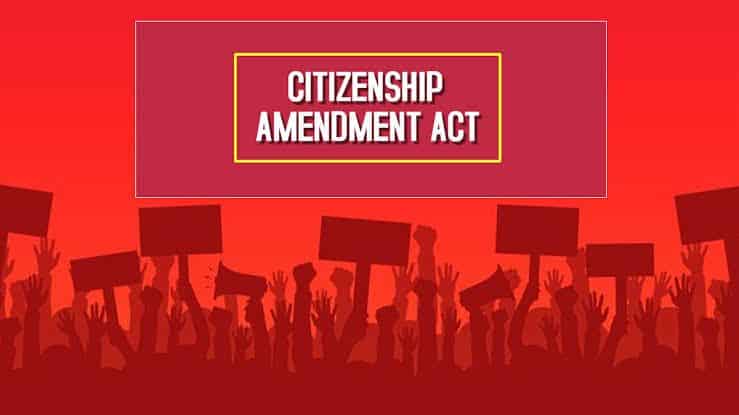
THE CITIZENSHIP AMENDMENT ACT LATEST NEWS
Only just a few weeks before the Lok Sabha elections, the Modi government passed the citizenship amendment act (CAA), a move that has generated excitement as well as dread across the country. Due to the political importance of this decision, there have been numerous discussions, demonstrations, and conjectures about how it could impact the social framework and political environment of the nation.
What is caa?
- The Citizenship Act of 1955 was amended by the Citizenship (Amendment) Act, 2019 (caa), a legislative enactment passed by the Indian Parliament on December 11, 2019.
- The Citizenship Act of 1955 is amended by the caa to grant Indian citizenship to migrants from Afghanistan, Bangladesh, and Pakistan who are members of the Buddhist, Parsi, Hindu, Sikh, Jain, and Parsi communities, as well as Christians, and who arrived in India on or before December 2014, as a result of religious persecution back home.
- Immigrants who arrived in India by December 31, 2014, were eligible for expedited Indian citizenship under the citizen amendment act 2019. The change lowered the eleven-year residency requirement for naturalization to five years.
- The Act drew harsh criticism for not including Muslims in its jurisdiction.
Features of citizenship amendment act
- In order to offer Indian citizenship to undocumented immigrants of Hindu, Sikh, Buddhist, Jain, Parsi, and Christian descent from Afghanistan, Bangladesh, and Pakistan, the Act aims to alter the Citizenship Act, 1955. Stated differently, the Act aims to facilitate the process of Indian citizenship for those who have been persecuted in India’s neighbouring nations.
- For applicants who practice any of these six religions, the amendment specifically lowers the naturalization requirement from 11 to 5 years.
- The candidate must have entered India on or before December 31, 2014, in order to be eligible for citizenship.
- According to the caa amendment act, upon obtaining citizenship.
- these individuals will be considered Indian citizens as of the day of their admission into the country, and
- all legal actions taken against them over their citizenship or illegal migration will be terminated.
citizen amendment act 2019: What Does it Leave Out?
- Since 2019, the main opposition parties have argued that the law discriminates against Muslims, who account for around 15% of the nation’s population, because it singles them out.
- The government clarifies that Muslims cannot be regarded as persecuted minorities because Pakistan, Afghanistan, and Bangladesh are Islamic countries with a majority Muslim population.
- They do, however, guarantee that each submission from a different community will be given individualized consideration.
Citizenship amendment act: News Today
The rules for the controversial Citizenship Amendment Act of 2019 were notified today, weeks before the nation votes to choose a new government. The Center has insisted that regulations will take effect before the 2024 elections.
- Hindus, Jains, Christians, Sikhs, Buddhists, and Parsis who arrived in India on or before December 31, 2014, from Bangladesh, Pakistan, and Afghanistan, are to be granted citizenship under the law.
- The immigrant who has resided in India for at least five of the previous 14 years and for the last year will be awarded Indian citizenship. Previously, citizenship by naturalization was granted to the migrants after 11 years.
- The Sixth Schedule of the Constitution, which includes the tribal territories of Karbi Anglong in Assam, Garo Hills in Meghalaya, Chakma district in Mizoram, and Tribal areas district in Tripura, exempts these regions from the legislation.
- Following the presidential assent to the California Accord, which was ratified by Parliament in December 2019, there were protracted protests around the country, especially in the Northeast.
- Prior to the Lok Sabha elections, Union Home Minister Amit Shah had stated that citizen amendment act2019 regulations would be announced and put into effect.
Rules for CAA 2024
- As per the 2019 modification to The Citizenship Act, 1955, the regulations seek to provide citizenship to immigrants from Pakistan, Afghanistan, or Bangladesh who were part of the Hindu, Sikh, Buddhist, Jain, Parsi, or Christian groups and who arrived in India prior to December 31, 2014.
- The Home Ministry is investigating the possibility of establishing an online application, processing, and citizenship issuance mechanism in accordance with the caa amendment act.
- Those of Indian descent, Indian citizen spouses, Indian citizen minor children, Indian citizen individuals with registered Indian citizen parents, and holders of Overseas Citizens of India Cards are among the eligible applicants.
Amidst heated discussions and protests through, the Modi government’s adoption of the Citizenship Amendment Act, which came just a few weeks before the Lok Sabha elections, has caused uproar. Critics claim it is a provocative strategy meant to divide voters along religious lines, while advocates see it as a humanitarian act. The fact that the law was put into effect during election season has only added to the flames and exacerbated the gulf between parties.
For any latest news, legal topics, judiciary exams notifications, patterns, etc watch Jyoti Judiciary’s YouTube channel for legal videos for any updates at https://youtube.com/@jyotijudiciarycoaching4852?si=2cwubh9d2A9urwJf


